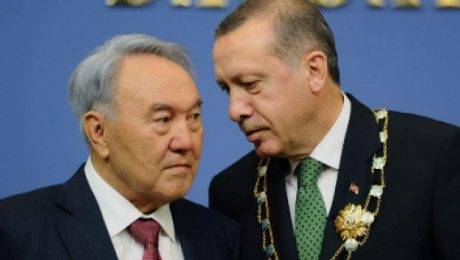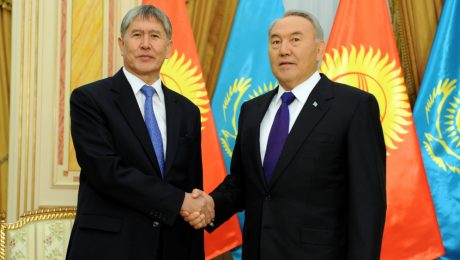Keyword: Kazakhstan

Turkish Teachers In Kazakhstan Fear Going Home
Despite promises by Nazarbaev not to return Turkish citizens to Turkey, the country’s bureaucracy is throwing up roadblocks to make it possible to stay in Kazakhstan. Political scientist Aidos Sarim accuses low-level bureaucrats of failing to follow Nazarbaev’s orders.

Nazarbayev says Kazakh-Turk schools belong to Kazakhstan, no extradition of teachers
Kazakh President Nursultan Nazarbayev said on Thursday that Kazakh-Turk high schools that are allegedly linked to the faith-based Gülen movement belong to Kazakhstan and that Turkish teachers working at those schools will not be extradited to Turkey unless they are proven guilty of a crime.

Gulen-Linked Turkish Schools In Kazakhstan Being Renamed
Turkish-Kazakh schools across Kazakhstan are being renamed amid a campaign by Turkey against the exiled Turkish Muslim cleric Fethullah Gulen. The Turkish-Kazakh schools were co-founded by Gulen’s Hizmet movement and his followers and have been functioning in Kazakhstan since early 1990s.

Panel Discussion – The Gulen Schools In Central Asia
Kazakhstan’s President Nursultan Nazarbaev rather quickly defused the problem with Turkey by making a visit to Ankara to meet with President Erdogan. Nazarbaev did not agree to close down the Gulen schools in Kazakhstan, but he did promise to carefully scrutinize those running the schools and those teaching in them.

Kazakh leader heads to Turkey to explain decision over Gulen schools
The official announcement did not provide any details about the visit, but Nazarbayev is expected to smooth over any disagreements between the two Turkic countries following the failed coup. The Kazakh-Turkish schools employ 1,124 teachers, of whom 1,030 are Kazakh citizens (91.7%) and 94 are Turkish citizens (8.3%).” Kazakhstan also has the Suleyman Demirel University, opened in Almaty in 1996.

Astana says Gulen-linked schools to remain
The Ministry of Education of Kazakhstan said in a statement on July 30 that the Turkish schools linked to Fetullah Gülen, who allegedly led failed coup attempt in Turkey according to the President Erdogan, will remain on the territory of the Central Asian nation. The statement followed the Friday warning of Turkey’s ambassador to Kazakhstan.

Kazakhstan and Kyrgyzstan Reject Turkish Calls to Close Gülen Schools
Kazakh authorities said the Gülen schools would remain open. In a statement, the Education Ministry said “These schools (27) will be working as they used to.” The schools were established through a bilateral deal signed by Kazakh president Nursultan Nazarbayev and then-Turkish President Turgut Özal shortly after independence, according to Akipress. Both Kazakhstan and Kyrgyzstan are remaining firm that they will not bend to Ankara’s will on this issue.

Atyrau Kazakh-Turk High Schools celebrates its 20th anniversary
Ayhan Özcimbit It was exactly 20 years ago on August 25th in 1993 when Mr. Suleyman, Ali and I arrived in the city Atyrau -formerly known as Guryev- located off the Caspian Sea. The provincial education department official, Ms. Jayla greeted us with flowers and then we moved in an apartment in the neighborhood Avangart. […]

Kazakh President congratulated ‘Katev’ Foundation on 20th anniversary
Students of the Kazakh-Turkish high schools for the past 20 years have gained many medals in international competitions. The President of Kazakhstan expressed his confidence that the graduates of “Katev” Fund would be highly qualified and would contribute to the economic development of the country as well as to strengthening of fraternal relations between Kazakhstan and Turkey.

Minister Yazici Visits Kazakh-Turkish High School
Customs and Trade Minister Hayati Yazici visited the local Nurorda International Kazakh-Turkish High School besides his official visits on day-two of his Astana itinerary. As a part of his agenda, Hayati Yazici hosted by the Kazakh Finance Minister Bolat Jamisev, met with the Turkish businessmen engaged in Kazakhstan at Rixos President Hotel on June 21. […]

Dialogue Eurasia Institute Opens in Kazakhstan
A new dialogue institute has been launched within Eurasia State University in Astana. The institute, jointly founded by Dialogue Eurasia Platform, Kazakhstan Historians Association, Kazakhstan Theologians Association and Kazakh TV will offer classes on the lives and contributions of influential personalities in the fields of history, politics, and philosophy. Eurasia University Rector Yerlan Sidikov at […]





















